‘Batman’ price hikes. Disney+ discounts. What is entertainment worth to you?
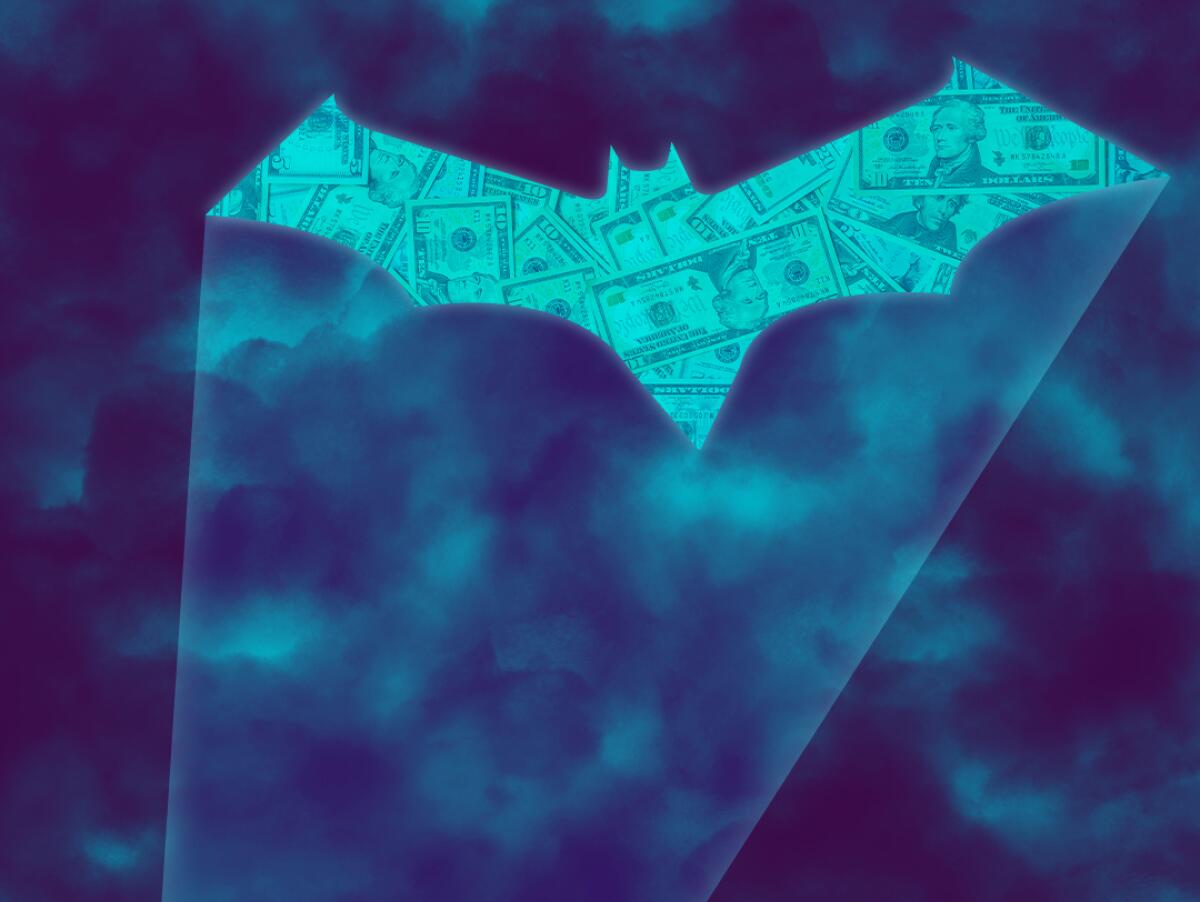
- Share via
Welcome to the March 8, 2022, edition of the Wide Shot newsletter about the business of entertainment. If this was forwarded to you, sign up here to get it in your inbox.
AMC Theatres Chief Executive Adam Aron’s boast last week that tickets for “The Batman” would cost “slightly more” than other movies was an eye-popping moment for Hollywood.
Movie theaters routinely charge more for IMAX and Dolby screenings and offer discounts for seniors. But jacking up prices for a particular movie because it’s popular? That was long considered a no-go zone.
Some producers, speaking to the Times anonymously, called AMC’s decision a small but necessary step toward so-called variable pricing, which could help exhibitors stay solvent as the theatrical business faces growing competition from streaming. It eventually could lead to a new model that gives patrons an incentive to see smaller movies in theaters.
Most, however, were surprised that theaters would try to squeeze more cash out of film fans amid a tenuous post-pandemic recovery. “We should be doing everything we can to bring people back,” said one studio executive, who was not authorized to comment. “This feels like a money grab.”
Much of the ire was directed at Aron, who called his company a “bold thinker in the area of pricing” in keeping with the company’s expansion into NFTs and retail popcorn. AMC declined to comment.
But it wasn’t just AMC, which in Burbank charged $19.49 for a standard ticket to “The Batman,” or $1.50 more than the nearly 3-week-old “Uncharted” from Sony and “Dog” from MGM. Cinemark and Regal locations in Los Angeles were charging about $1 more to see Robert Pattinson’s Caped Crusader than other movies, according to their ticketing websites.
It didn’t not work. “The Batman” grossed $134 million in box office sales through Sunday in the U.S. and Canada, surpassing expectations for the Warner Bros. film. It’s unclear how much raising prices benefited AMC or Warner Bros. Exhibitors determine ticket prices, and studios are prohibited from telling theaters what to charge. AMC on Monday said it sold 4 million in the U.S., Europe and the Middle East over the weekend.
More on the theatrical stuff in a bit. I’m most interested in a question that has become hugely important in showbusiness: What are people willing to pay for entertainment?
Movie theaters are thinking about this as they cope with a world where fewer hits dominate the box office.
Media companies are trying to figure out the best pricing strategies for their streaming services, which need to be priced low enough to keep attracting viewers.
The prime example is Walt Disney Co., which later this year will roll out a cheaper, ad-supported tier as it tries to hit its subscription goal of 230 million to 260 million by 2024. The ad-free version is $8 a month, which is already cheaper than its rivals.
With both “Batman” tickets and Disney+ subscriptions, the tweaks are a test of how much the price of a thing affects whether people will buy it. Economists call this “price elasticity of demand.” If an increase in the price of a good or service makes people much less likely to purchase it, the good or service is considered to be “elastic.” If there’s little change in demand based on price, the good or service is “inelastic.”
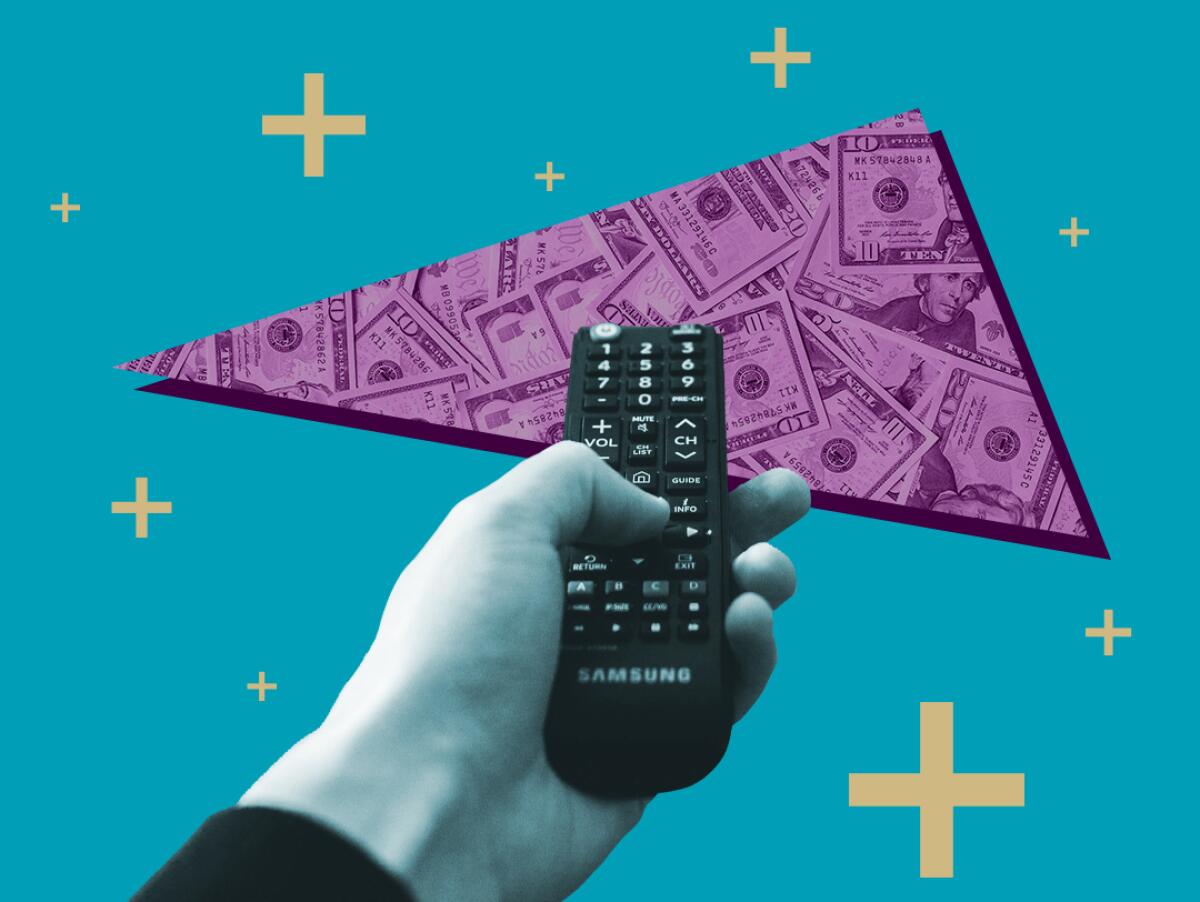
Streaming service users are price sensitive, and there’s a growing recognition that viewers are feeling oversubscribed.
According to data firm Antenna, 32% of streaming subscription sign-ups last year were for ad-supported versions, compared to 19% in 2020. For services including Hulu, Paramount+ and Peacock, ad-supported tiers contributed more than half of their subscribers.
“The clear implication is that if you give consumers the option to save money with a lower-cost ad-supported tier, the majority will take that option,” LightShed Partners’ Rich Greenfield wrote in a blog post.
As for movie tickets, there’s reason to believe that demand for the biggest films will stay strong despite small price hikes. It’s hard to imagine the typical audience member for “The Batman” — a young male who wants to see the movie right away to avoid spoilers — will choose not to see it in order to save $1.50.
Still, uniform pricing has been the norm since the 1970s. According to a 2007 paper by University of Arizona law professor Barak Y. Orbach and Stanford economics professor Liran Einav, variable pricing was employed in prior decades, but that changed as the industry transitioned to one dominated by multiplexes.
In 1999, Seagram Co. CEO Edgar Bronfman Jr. suggested charging more for bigger-budget films. Bronfman, whose company owned Universal Studios, was swiftly mocked into dropping the idea.
But the basic concept is not new. Demand-based pricing has long been common in other ticketed industries, including concerts and sports. Steven Spielberg once predicted a future in which “[y]ou’re going to have to pay $25 to see the next ‘Iron Man.’ And you’re probably only going to have to pay $7 to see ‘Lincoln.’”
So it’s worth laying out the steel-man case for variable pricing.
In the best-case version of Spielberg’s scenario, the plan could mean more tickets sold for the next “Lincoln” than if the tickets were $15.
The studio sets a minimum rate of revenue it receives per ticket sold to hedge against wild pricing changes.
For the theaters, attendees who buy a discounted ticket can still buy their marked-up snacks and soda. In theory, this could make smaller movies more viable as theatrical releases.
Some will say the idea violates a core tenant of moviegoing culture, which is that it’s an inexpensive form of entertainment compared to sports and concerts. Hollywood does not want to become Broadway. It could also create an incentive for moviegoers to buy a ticket for a less expensive film and sneak into the more popular one (though reserved seating should prevent that).
And the concert industry isn’t a great comparison. A popular band’s tour comes to a big city maybe once a year. A movie plays in the same auditorium multiple times a day. This is why you rarely hear about ticket scalping at movie theaters.
Still, some analysts are open to seeing how it plays out.
“It’s an interesting experiment that might work to enhance profitability when used for tentpole/franchise films,” said veteran entertainment industry investor Hal Vogel. “For most films, I doubt this pricing strategy is beneficial for the industry as a whole, though it might work selectively.”
The most common objection is that charging a lower price for certain movies will signal to consumers that those movies aren’t as good. Directors won’t feel great about their work being relegated to the bargain bin.
But theater operators may not worry about that as long as they can still get people to pay $8 for a bag of popcorn. Which, if you ask most moviegoers, is the real pricing outrage.
Disney’s ‘Don’t Say Gay’ response
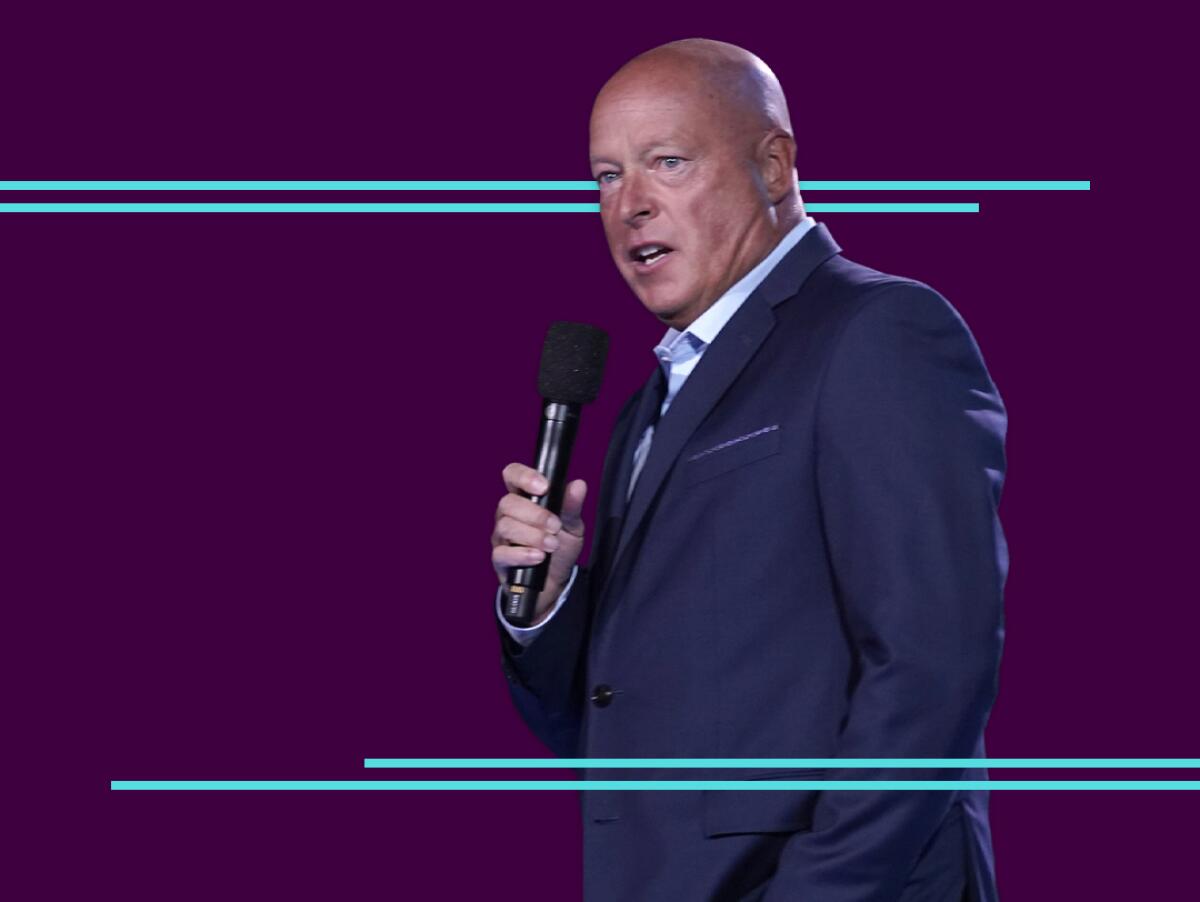
Walt Disney Co. has been hit with criticism for its lack of response to Florida’s controversial bill that seeks to limit classroom discussions of sexual orientation and gender identity. Moreover, Disney has taken heat for donating to politicians who have supported the legislation.
Disney CEO Bob Chapek sent a lengthy memo to staff explaining why the company has not released a statement condemning Florida’s “Don’t Say Gay” bill, as it is described by activists. Keeping a more neutral voice than his predecessor Bob Iger on such issues, Chapek said corporate statements “do very little to change outcomes or minds” and instead are “often weaponized by one side or the other to further divide and inflame.”
The Monday email came amid mounting public pressure and followed a meeting with small group of LGBTQ+ leaders at Disney. This comes after Disney decried Vladimir Putin’s war in Ukraine and paused its theatrical releases in Russia, but has been tight-lipped about Florida, not to mention human rights abuses in China, its biggest foreign market.
Chapek also addressed concerns about Disney’s donations to politicians who support the legislation. He said Geoff Morrell, the entertainment giant’s new chief corporate affairs officer, would be “reassessing our advocacy strategies around the world — including political giving.”
This was clearly not enough to stop multiple people who work for Disney from speaking out publicly about the company’s reticence. In fact, the email appeared to inflame passions.
“I love working for you so much Disney, it’s all I ever dreamed of and still all I want to keep doing,” said animation writer Benjamin Siemon on Twitter, whose credits include “DuckTales,” after posting a video asking the company to take a stand. “But you really hurt the LGBTQ+ community today. We’re in pain.”
More news and stuff we wrote
— Did Ye’s revenge music video go too far? Anousha Sakoui and Wendy Lee spoke to lawyers about the rapper formerly known as Kanye West’s disturbing video featuring a claymation Pete Davidson, who’s dating Ye’s ex Kim Kardashian.
— ‘It’s all from Bunnies’: Inside the ‘vicious’ feud tearing Playboy alumnae apart. Amy Kaufman takes us behind the scenes of the schism surrounding A&E’s “Secrets of Playboy,” a 10-episode docuseries that takes aim at the legacy of Hugh Hefner, the company’s late founder.
— What does Bandcamp’s sale to Epic Games mean for independent music? Since the announcement that online music distributor Bandcamp, a central hub for independent artists and labels selling digital and physical media, has been sold to Fortnite producer Epic Games, musicians and fans have been expressing concern that their beloved platform is on its way to becoming another victim of multinational consolidation, Randall Roberts writes.
— After Jeff Zucker’s exit, CNN streams forward with a new service. What happens now? Stephen Battaglio reports the details of CNN+, which will debut with an introductory price of $2.99 a month.
Number of the week

Another week, another big content company deal. Sony Pictures Television is acquiring a majority stake in Industrial Media, a major supplier of popular reality series. The size of the stake and the price were not disclosed, but the company said the deal values Industrial Media at $350 million.
Industrial, which has 100 employees in Los Angeles, New York and Atlanta, houses several production outlets including Sharp Entertainment, the maker of TLC’s “90 Day Fiancé” franchise. The company also owns 19 Entertainment, which makes the long-running competition shows “American Idol” for ABC and “So You Think You Can Dance” for Fox.
Hollywood production
Shoot days in the three main categories were up 26% last week compared with the same period last year and up 24% compared with 2020, according to FilmLA data. Week-to-week, production activity was down.
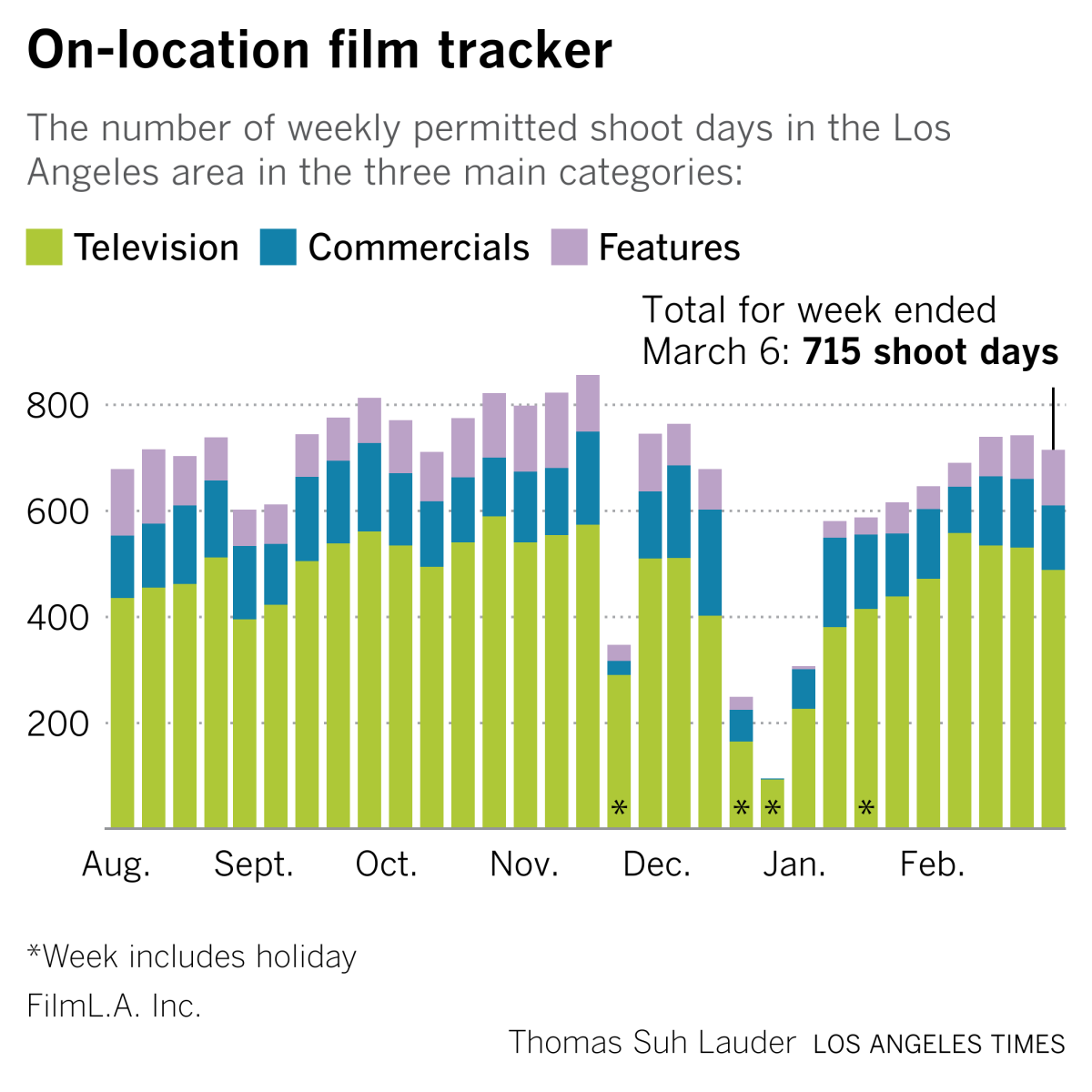
You should be reading...
— Will the U.S. try to stop Amazon from buying MGM? The Information reports that the Federal Trade Commission is preparing its case against the $8.5-billion deal.
— Could buying an NFT the way one buys a bag of Cheetos demystify the process? The Guardian visits New York’s vending machine for non-fungible tokens.
— How Peter Thiel backed an “anti-woke” film festival. Humorless millennials. Addled boomers. Tiresome liberals. Trevor Bazile wanted to shock them all — and use Silicon Valley money to do it. (Buzzfeed)
— Advertising acts as another vehicle of protest to Ukraine war. Criticism of Russia has become a common feature of advertisements and the marketing industry. (New York Times)
— Why the cultural boycott of Russia matters. Excluding Russia from the sports and art worlds over its war against Ukraine threatens Putin’s image in the way economic and political sanctions cannot. (The Atlantic)
— The ugly truth of how movie scores are made. The streaming revolution is changing the way film composers get paid and exposing the flaws of a system where big names farm their scores out to uncredited “ghost composers.” (Vanity Fair)
Finally... a little anarchy
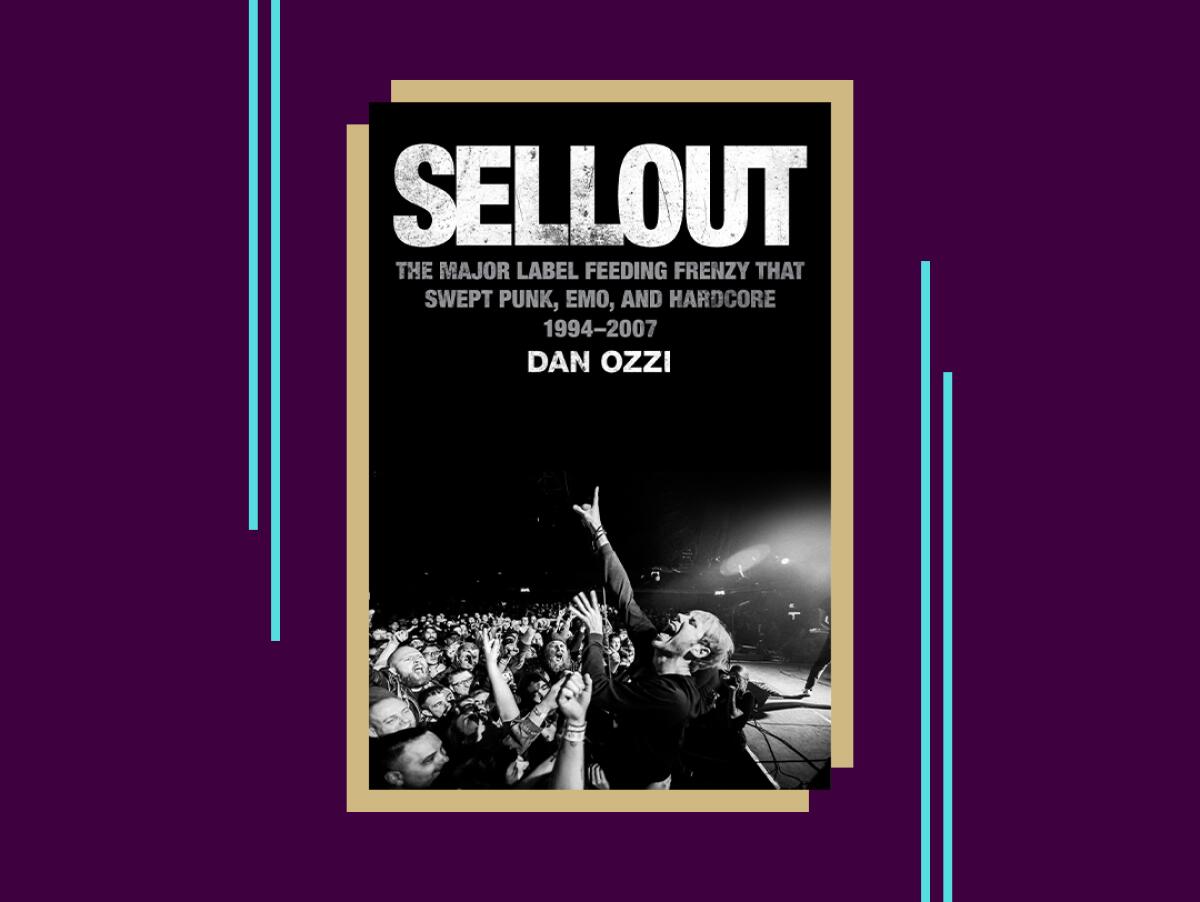
My brother gifted me a copy of his friend Dan Ozzi’s book “Sellout: The Major-Label Feeding Frenzy That Swept Punk, Emo, and Hardcore.”
It tells a series of engrossing stories about how bands like Green Day, Jawbreaker and Rise Against rose from obscurity to become major label artists. The Times reviewed the book in November.
Coincidentally, Against Me!’s independent debut album “Against Me! Is Reinventing Axl Rose” turned 20 years old on March 5. Here’s an oral history from SPIN.
Inside the business of entertainment
The Wide Shot brings you news, analysis and insights on everything from streaming wars to production — and what it all means for the future.
You may occasionally receive promotional content from the Los Angeles Times.




